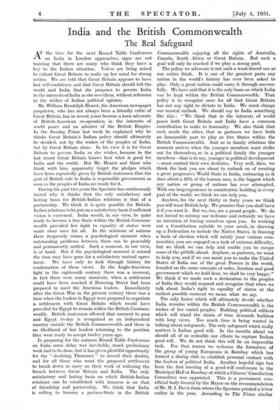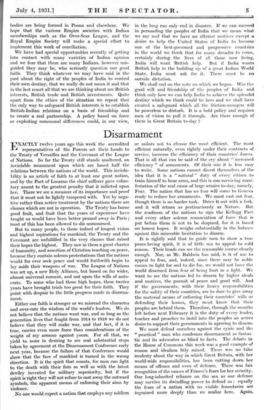India and the British Commonwealth
The Real Safeguard
ASthe time for the next Round Table Conference on India in London approaches, signs are not wanting that there are many who think they have a key to the Indian situation. Voices are being raised to exhort Great Britain to make up her mind for strong action. We are told that Great Britain appears to have lost self-confidence and that Great Britain should tell the world and India that she proposes to govern India in the interests of India as she sees them, without reference to the wishes of Indian political opinion.
Mr. William Randolph Hearst, the American newspaper proprietor, who has not always been a friendly critic of Great Britain, has in recent years become a keen advocate of British-American co-operation in the interests of world peace and an admirer of the British Empire. In the Sunday Times last week he explained why he thinks Great Britain's Indian policy should ultimately be decided, not by the wishes of the peoples of India, but by Great Britain alone. In his view it is for Great Britain to govern India as she wishes, because in the last resort Great Britain knows best what is good for India and the world. But Mr. Hearst and those who think with him, apparently forget the pledges which have been repeatedly given by British statesmen that the goal of British rule in India is responsible government as soon as the peoples of India are ready for it.
During the past two years the Spectator has continuously stated why it thinks that the only satisfactory and lasting basis for British-Indian relations is that of a partnership. We think it is quite possible for British- Indian relations to be put on a satisfactory basis if sufficient vision is exercised. India would, in our view, be quite ready to become a free State within the British Common- wealth provided her right to equality of status were made clear once for all. In the relations of nations there frequently comes a psychological moment when outstanding problems between them can be peaceably and permanently settled. Such a moment, in our view, is at hand. But if the psychological moment is missed the time may have gone for a satisfactory mutual agree- ment. We have only to look through history for confirmation of these views. In the Anglo-American fight in the eighteenth century there was a moment, in fact there were many moments, when a settlement could have been reached if Downing Street had been prepared to meet the American leaders. Immediately after the Great War in the present century there was a time when the leaders in Egypt were prepared to negotiate a settlement with Great Britain which would have provided for Egypt to remain within the British Common- wealth. British statesmen allowed that moment to paqs and Egypt to-day is recognized as an independent country outside the British Commonwealth and there is no likelihood of her leaders returning to the position they were ready to accept twelve years ago.
In preparing for the autumn Round Table Conference on India some delay was inevitable, much preliminary work had to be done, but it has given plentiful opportunity for the "doubting Thomases" to record their doubts, and for all those who want the proposed settlement to break down to carry on their work of widening the breach between Great Britain and India. The only satisfactory and lasting basis on which British-Indian relations can be established with firmness is on that of friendship and partnership. We think that India is willing to become a partner-State in the British Commonwealth enjoying all the rights of Australia, Canada, South Africa or Great Britain. But such a goal will only be reached if we play a strong part.
The policy we advocate is not such a weak-kneed one as our critics think. It is one of the greatest parts any nation in the world's history has ever been asked to play. Only a great nation could carry it through success- fully. We have said that it is the only basis on which India can be kept within the British Commonwealth. That policy is to recognize once for all that Great Britain has not any right to dictate to India. We must change our mental outlook. We should say to India something like this : "We think that in the interests of world peace both Great Britain and India have a common contribution to make to humanity. We also think that each needs the other, that as partners we have both an honourable part to play as free States within the British Commonwealth. Just as in family relations the moment arrives when the younger members must strike out for themselves, so in a political family the younger members—that is to say, younger in political development —must control their own destinies. Very well, then, we think the task you are about to embark on of creating a great progressive World State in India, embracing as it does about a fifth of the human race, is the biggest which any nation or group of nations has ever attempted. With our long experience in constitution building in every part of the world, we think we can help you.
Anyhow, for the next thirty or forty years we think you will want British help. We promise that you shall have it if you want it. But we, too, are a proud people. We do not intend to outstay our welcome and certainly we have no intention of forcing ourselves upon you. In working out a Constitution suitable to your needs, in drawing up a Federation to include the Native States, in framing a basis of election which will satisfy your various com- munities, you are engaged on a task of extreme difficulty, but we think we can help and enable you to escape some of the pitfalls ahead. Anyhow, as partners, we want to help you, and if we can assist you to make the United States of India one of the great Powers in the world, founded on the same concepts of order, freedom and good government which we hold dear, we shall be very happy." We think if we made such a declaration to the peoples of India they would respond and recognize that when we talk about India's right to equality of status at the earliest possible moment we mean what we say. The only factor which will ultimately decide whether India remains within the British Commonwealth is the wishes of her varied peoples. Building political edifices which will stand the strain of time demands builders with long views. Too much, time is being wasted in talking about safeguards. The only safeguard which really matters is Indian good will. In the months ahead we should all of us redouble our efforts to capture Indian good will. We do not think this will be an impossible task. For that reason we welcome the formation of the group of young Europeans in Bombay which has formed a dining club to establish personal contact with the leaders of political India. Another hopeful sign has been the first meeting of a good-will conference in the Municipal Hall at Bombay at which a Citizens' Conciliation Committee was appointed. This is a permanent non- official body formed by the Mayor on the recommendation of Mr. M. I. Davis from whom the Spectator printed a letter earlier in the year. According to The Times similar bodies are being formed in Poona and elsewhere. We hope that the various- Empire societies with Indian memberships such as the Over-Seas League, and the Royal Empire Society will make a special effort to implement this work of conciliation.
We have had special opportunities recently of getting into contact with many varieties of Indian opinion and we fear that there are many Indians, however mis- guided they may be, who seriously question our good faith. They think whatever we may have said in the past about the right of the peoples of India to control their own destiny, that we really do not mean it and that in the last resort all that we are thinking about are British interests, British trade and British investments. Quite apart from the ethics of the situation we repeat that the only way to safeguard British interests is to establish British-Indian relations- on a basis of friendship and to create a real partnership. A policy based on force or exploiting communal differences could, in our view, in the long run only end in disaster. If we can succeed in persuading the peoples of India that we mean what we say and that we have no ulterior motives except a desire to help the United States of India to become one of the best-governed and progressive countries in the world we think that for many decades to come, certainly during the lives of all those now living, India will want British help. But if India wants British help in the building up of a great Indian World State, India must ask for it. There must be no outside dictation.
We shall end on the note on which we began. Win the good will and friendship of the peoples of India and think only how we can help India to achieve the splendid destiny which we think could be hers and we shall have created a safeguard which all the friction-mongers will be powerless to disturb. It is a bold policy and requires men of vision to pull it through. Are there enough of them in Great Britain to-day ?











































 Previous page
Previous page